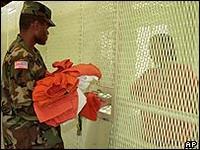Guantanamo prisoners sue the U.S.

9/10/2005 10:00:00 AM GMT
Eight former Russian Guantanamo prisoners plan to sue the U.S. for holding them illegally, according to Ekho Moskvy radio station.
Airat Vakhitov, the most active of the group, has been in close contact with Russian rights groups and activists. Vakhitov now is writing a book about Guantanamo, he told the radio station, adding that the current life of the former detainees is very difficult.
Two of the freed Russian prisoners have been under examination facing charges of "terrorism", and one is dying of injuries he sustained in the U.S. detention center at Guantanamo Bay Cuba.
In the lawsuit he filed, Vakhitov complained that he was subjected to torture while awaiting the trial.
The U.S. arrested eight Russians in its “counter-terrorist” operation in Afghanistan and kept them at the Guantanamo base in Cuba. In 2004, the eight Russians were extradited home.
Hunger strike continues
Eight former Russian Guantanamo prisoners plan to sue the U.S. for holding them illegally, according to Ekho Moskvy radio station.
Airat Vakhitov, the most active of the group, has been in close contact with Russian rights groups and activists. Vakhitov now is writing a book about Guantanamo, he told the radio station, adding that the current life of the former detainees is very difficult.
Two of the freed Russian prisoners have been under examination facing charges of "terrorism", and one is dying of injuries he sustained in the U.S. detention center at Guantanamo Bay Cuba.
In the lawsuit he filed, Vakhitov complained that he was subjected to torture while awaiting the trial.
The U.S. arrested eight Russians in its “counter-terrorist” operation in Afghanistan and kept them at the Guantanamo base in Cuba. In 2004, the eight Russians were extradited home.
Hunger strike continues
hunger strike by some 210 detainees held at the U.S. detention center at Guantanamo Bay, has entered a second month, according to the U.S. military.
It is feared that some of the detainees may die as a result of the strike.
Lawyers for the prisoners said that 210 prisoners were still taking part in the strike that began on 8 August, but a prison spokesman put the figure at 87. The spokesman added that at least ten prisoners were being fed through nose tubes.
Officials from the International Committee of the Red Cross are set to visit the U.S.-run prison, to check on the inmates’ health condition.
The detainees are planning to continue the strike until they get a fair hearing and humane treatment, said one of the inmates lawyer.
Last June, Guantanamo detainees went on a hunger strike and the prisoners' lawyers said it was so severe that 50 men had to be intravenously fed.
"Much more severe"

But the U.S. military officials refused to reveal the exact number of inmates who had refused food for a whole month.
Gitanjali Gutierrez, of the New York-based Center for Constitutional Rights, said the strike had become "much more severe".
The detainees began striking in 2002 because of their "uncertain future", Gutierrez told the BBC.
"Now they are striking because of their indefinite detention without any fair process, and because of the inhumane treatment they're experiencing on the base," he added.
Abubaker Deghayes, brother of a British detainee reportedly on hunger strike called on the UK government to intervene.
Deghayes said his 36-year-old brother Omar had not eaten for nearly five weeks.
"I'm really worried. Something really needs to be done. We can't just allow people to be oppressed and tortured," he said
“Torture shackles”
Human rights activists dressed in Guantanamo-style orange boiler suits gathered last week in protest at Birmingham handcuff and baton manufacturer Hiatt & Company for continuing to export to the U.S. handcuffs and other products used to hold prisoners at Camp X-Ray at Guantanamo.
The protesters included former Guantanamo detainee Moazzam Begg, who said that cuffs used to restrain him carried its name and the words "Made in England".
A letter in a national newspaper, signed by Birmingham MPs Clare Short, Lynne Jones, Mr Begg, Mr Stafford-Smith and the brother of hunger-striker Omar Deghayes, called on the company to "commit to voluntarily and permanently ban all further exports to the U.S. military and hence to Guantanamo Bay".
"I have no evidence to suggest they are currently exporting banned products but certainly they have in the past. I think it's worrying that these items are still exportable ... it is something they should be ashamed of," Ms Jones, MP for Birmingham Selly Oak, said.
"When I was in Guantanamo Bay, one of the things I pointed out to my lawyer was how it was ironic that these shackles were made in England, just like me and him. It was very bizarre. Those shackles would often cut into my arms and legs and make me bleed. It was those very same shackles I saw being used by American soldiers in Bagram airbase to hang a prisoner from the ceiling. It said 'Made in England' on there too. If these cuffs are used to shackle people up to the tops of ceilings or cages and then [those people are] beaten, it calls into question what those shackles are actually being used for."
Guantanamo prison has long been the centre of international concern and controversy.
Link Here




0 Comments:
Post a Comment
<< Home